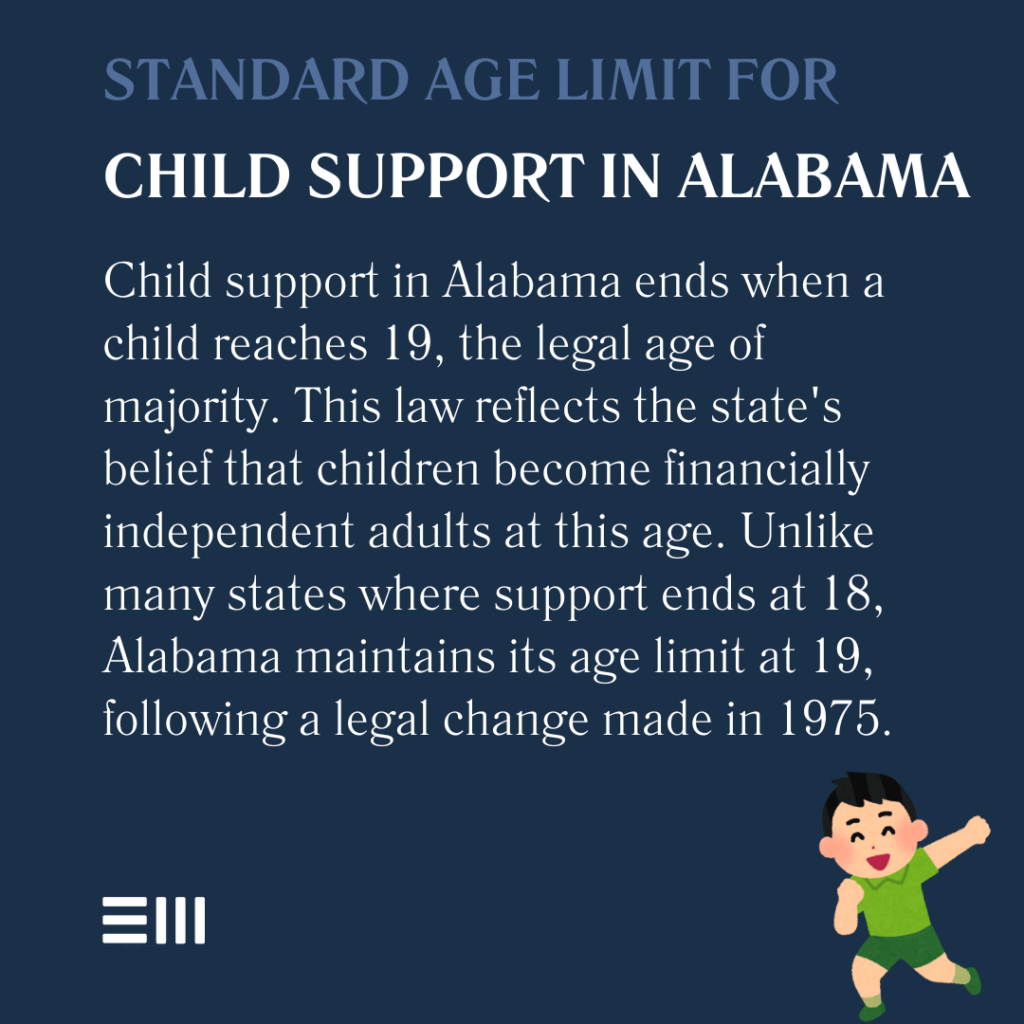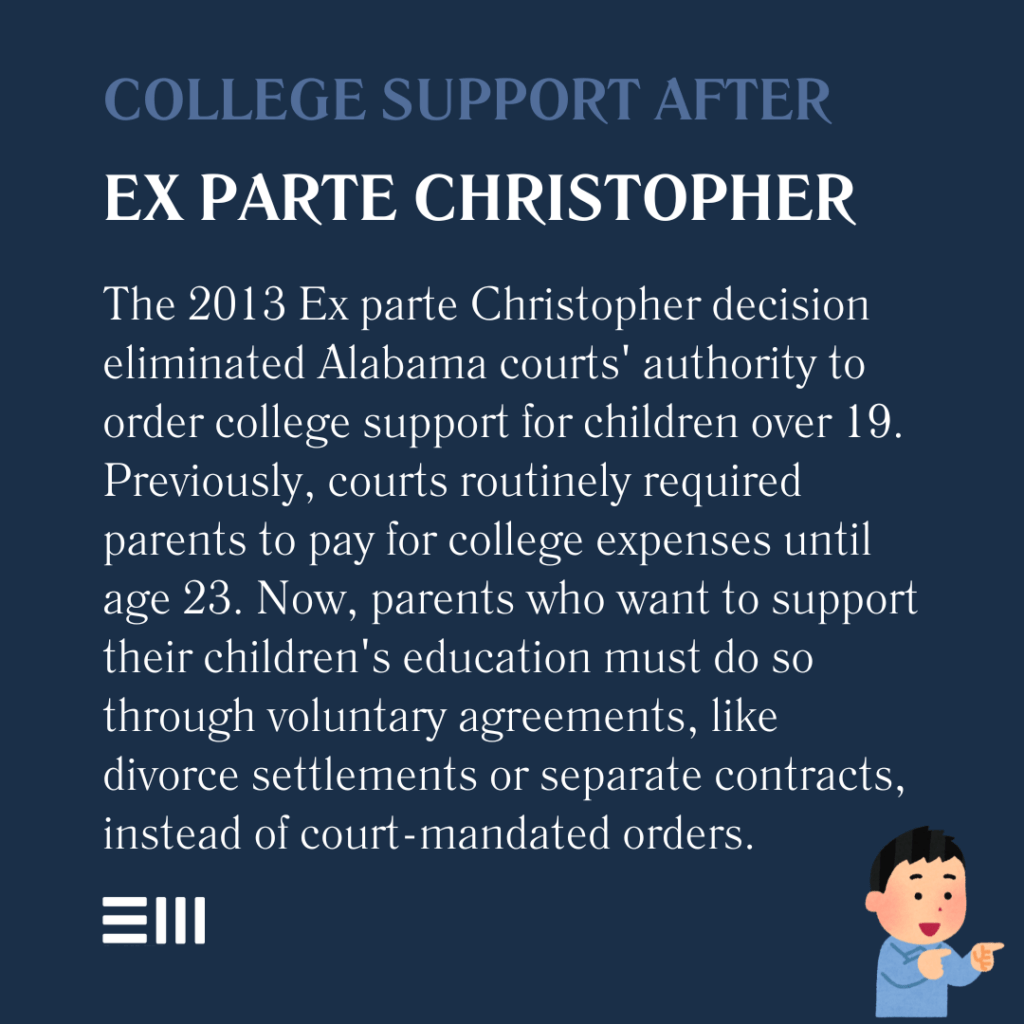
In October 2013, the Alabama Supreme Court delivered a landmark ruling that fundamentally transformed family law across the state.
The court’s decision in Ex parte Carolyn Sue Christopher overturned 24 years of established precedent that had allowed judges to order divorced parents to pay college expenses for their adult children.
One mother’s refusal to contribute to her 19-year-old son’s $9,435 per semester college costs sparked a legal battle that ultimately reached Alabama’s highest court, which ruled that child support legally ends at age 19.
This watershed case redefined the financial relationship between divorced parents and their adult children, establishing clear boundaries that continue to shape Alabama family court decisions today.
The Standard Age Limit for Child Support in Alabama
In Alabama, child support obligations typically continue until a child reaches the age of 19, which is the state’s legal age of majority. This standard cutoff represents the point at which the law presumes children become financially independent adults.
The age of majority in Alabama differs from many other states where support ends at 18. This distinction stems from Alabama’s statutory definition established in 1975 when the legislature reduced the age of majority from 21 to 19.
The state’s courts have consistently upheld this standard, affirming that upon reaching 19, a child is legally considered an adult with full rights and responsibilities, including financial self-sufficiency.
While this provides clarity for most families, several important exceptions and special circumstances can extend or terminate this obligation earlier.

Historical Context of Alabama’s Child Support Age Limit
Alabama’s approach to child support age limits has evolved significantly over time, with the most dramatic shift occurring through a series of landmark court decisions. Understanding this history provides valuable context for current law.
For over a century, Alabama courts consistently interpreted child support obligations as ending when children reached the age of majority. This principle was affirmed in numerous cases including Beasley v. Watson (1867), which established that fathers were “bound, by the common law, to support and educate his children during their minority.”
This traditional view remained unchallenged until 1989, when the Alabama Supreme Court’s decision in Ex parte Bayliss expanded support obligations to include college expenses for adult children. For the next 24 years, courts regularly ordered parents to pay these postminority educational expenses.
Everything changed in 2013 with Ex parte Christopher, when the Supreme Court reversed course, declaring that “the plain meaning of ‘children’ as that term is used in § 30–3–1 unambiguously means ‘minors.'”
The court determined it had erred in Bayliss by interpreting the child support statute to extend beyond age 19. This ruling effectively eliminated court-ordered postminority educational support, returning Alabama to its pre-1989 standard where child support conclusively ends at 19.
Exceptions to the Age 19 Limit
While Alabama law generally terminates child support at age 19, several important exceptions exist that can either extend or prematurely end the support obligation. These exceptions address special circumstances that impact a child’s need for continued financial support.
The primary exception involves children with disabilities. In Ex parte Brewington (1983), the Alabama Supreme Court established that support obligations may continue indefinitely for children with serious physical or mental disabilities that prevent self-sufficiency.
This exception acknowledges that some children, due to their disability status, continue to require parental support despite reaching the age of majority.
Other situations that can affect the duration of child support include:
- Emancipation of minors before age 19, which terminates support obligations;
- Military enlistment of a child before reaching age 19;
- Marriage of a minor child;
- Death of either the child or the paying parent; and
- Voluntary agreements between parents extending support beyond age 19.
The emancipation exception recognizes that some minors establish independence earlier through legal proceedings or life circumstances.
Conversely, parents who wish to provide continued support beyond age 19 may voluntarily create binding agreements to do so, even though courts can no longer mandate such arrangements.
College Support After Ex Parte Christopher
The 2013 Ex parte Christopher decision fundamentally changed how Alabama handles college expenses for children of divorced parents. This landmark ruling eliminated courts’ authority to order postminority educational support that had been common practice for over two decades.
Prior to this decision, Alabama courts regularly ordered noncustodial parents to contribute to college expenses under the Bayliss precedent. These orders typically covered tuition, books, housing, and other educational costs, often continuing until age 23 or completion of undergraduate education.
The Christopher court determined this practice had improperly “unsettled” established law by expanding the meaning of “children” beyond minors.
Today, parents who wish to provide college support have several options:
- Including voluntary college support provisions in divorce settlements;
- Creating separate contractual agreements for educational expenses;
- Establishing college funds or trusts during the marriage; and
- Negotiating informal arrangements outside court supervision.
These voluntary arrangements, when properly drafted and executed, remain enforceable as contracts rather than as child support orders.
Parents considering such agreements should ensure they include specific terms regarding duration, expenses covered, academic requirements, and conditions for termination.
This approach allows parents to support their children’s higher education while respecting the legal boundaries established by current Alabama law.

How Child Support Termination Works in Alabama
When a child reaches age 19 in Alabama, child support does not automatically stop without action by the paying parent. Understanding the proper termination process helps avoid overpayment and potential legal complications.
The termination process typically involves these steps:
- Filing a petition to terminate child support with the court that issued the original order;
- Providing proof that the child has reached age 19;
- Requesting a final accounting of any arrears or overpayments;
- Obtaining a formal court order terminating the support obligation; and
- Notifying the Alabama Child Support Payment Center if payments are processed through the state.
Parents should initiate this process approximately 30-60 days before the child’s 19th birthday to ensure timely termination. Importantly, any support arrears accumulated before the child turned 19 remain fully enforceable even after termination of ongoing support.
Overpayments made after a child turns 19 but before obtaining a termination order may be difficult to recover, highlighting the importance of proactive action.
Frequently Asked Questions About Alabama Child Support Age Limits
Navigating Alabama’s child support age limits involves understanding various legal nuances and practical considerations.
These commonly asked questions address situations many parents face when approaching their child’s 19th birthday.
What Happens if My Child Turns 19 While Still in High School?
In Alabama, child support legally terminates when a child reaches 19, even if they are still attending high school. Unlike some states that extend support until high school graduation, Alabama law makes no exception for high school completion. However, parents can voluntarily agree to continue support until graduation, though courts cannot order it.
Can Parents Agree to Extend Child Support Beyond Age 19?
Yes, parents can create legally binding agreements to extend support beyond Alabama’s statutory age limit. These agreements must be voluntary and properly documented, typically in a divorce settlement or separate contract. Courts will generally enforce such agreements as contractual obligations rather than as standard child support orders.
Does Child Support Automatically Stop When My Child Turns 19?
No. Even though the legal obligation ends at 19, the paying parent must typically file a petition to terminate the support order. Without this formal termination, payments technically remain due according to the existing order, potentially creating complications with enforcement agencies and employment withholding.
What if My Child Has Special Needs or Disabilities?
Support may continue indefinitely for children with disabilities that prevent self-sufficiency. Parents must demonstrate the child’s disability existed before age 19 and substantially impairs their ability to support themselves. Courts evaluate medical evidence, employability, and the child’s specific needs when determining continued support.
Can I Be Forced to Pay for My Child’s College Expenses?
Not since the 2013 Ex parte Christopher decision. Alabama courts no longer have authority to order parents to pay college expenses for children over 19. Any college support must be voluntarily agreed upon by the parents, typically as part of divorce proceedings or in a separate contract.
Secure Your Child Support Rights Today
The complex interplay of Alabama’s child support laws, court precedents, and individual family circumstances requires expert navigation.
Our experienced family law attorneys understand the nuances of child support age limits and can help you protect your interests whether you’re paying or receiving support.
From filing termination petitions to negotiating college support agreements, we provide the skilled representation needed to ensure fair outcomes for both parents and children.
Contact us today for a confidential consultation to discuss your specific situation and develop a strategy tailored to your family’s needs.
Can't find what you're looking for? Search our site below.










